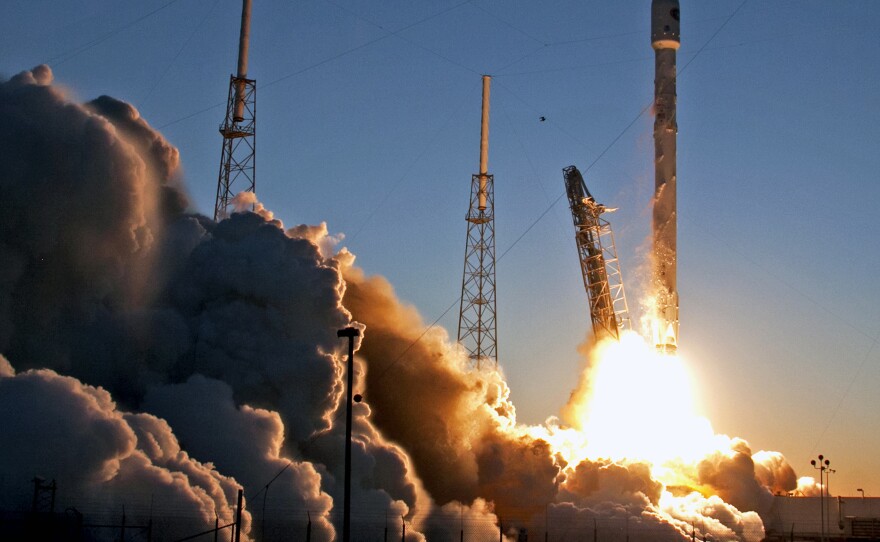Updated at 4:50 p.m. ET.
SpaceX has delayed the launch of its Falcon 9 rocket and Dragon spacecraft by a day, after fast-approaching storm clouds moved into Cape Canaveral, Florida, according to the AP. In a tweet, SpaceX said the next opportunity for a launch will be tomorrow, Tuesday, at 4:10 p.m. ET.
The craft is on an official resupply mission to the International Space Station. The private company has previously led six successful missions, so that shouldn't be the hard part. What will be difficult, and what hasn't been done before, is landing the first stage of the rocket on a barge floating in the Atlantic Ocean.
Before first trying this in January, SpaceX said:
"During our next flight, SpaceX will attempt the precision landing of a Falcon 9 first stage for the first time, on a custom-built ocean platform known as the autonomous spaceport drone ship. While SpaceX has already demonstrated two successful soft water landings, executing a precision landing on an unanchored ocean platform is significantly more challenging. "The odds of success are not great — perhaps 50% at best. However this test represents the first in a series of similar tests that will ultimately deliver a fully reusable Falcon 9 first stage."
For that mission, the Falcon 9 was 14 stories tall, traveling nearly a mile a second. The company said balancing it would be "like trying to balance a rubber broomstick on your hand in the middle of a windstorm." SpaceX attempted to land the Falcon 9 on an "autonomous spaceport drone ship" that was 300 by 100 feet, with "wings" that could extend the width to 170 feet.
That attempt failed after the booster stage came down too hard and broke apart, ending in a fiery explosion. SpaceX founder Elon Musk tweeted of the failure, "Close, but no cigar this time." A second attempt to land the Falcon 9 in February failed as well, with the rocket coming within 10 meters of its target, according to SpaceX.
CNN reports that Musk wants to find ways to "reuse rockets just like airplanes," so "the cost of access to space will be reduced by as much as a factor of a hundred."
Both SpaceX corporate headquarters and NASA's Kennedy Space Center will webcast Monday's event live. SpaceX says if all goes as planned, the Dragon spacecraft will arrive at the International Space Station about two days after liftoff, carrying "more than 4,300 pounds of supplies and payloads, including critical materials to support about 40 of ... more than 250 science and research investigations." After five weeks at the space station, the Dragon spacecraft will return with over 3,000 pounds of cargo and packaging.
Copyright 2015 NPR. To see more, visit http://www.npr.org/.






